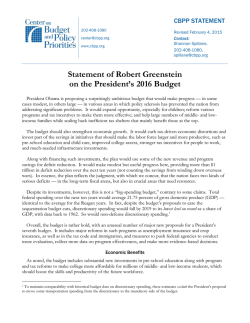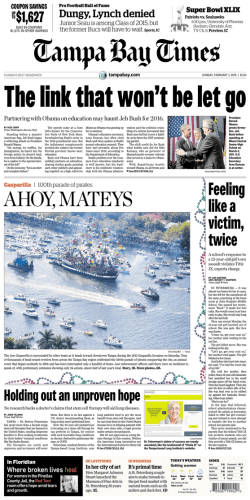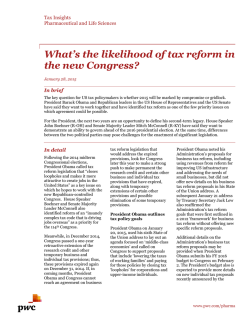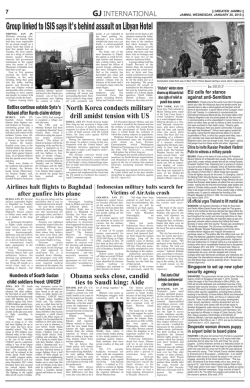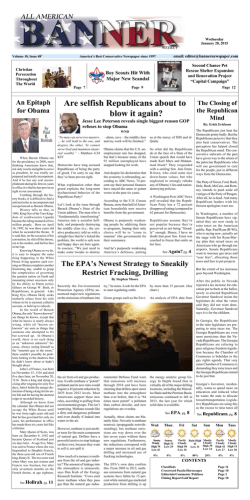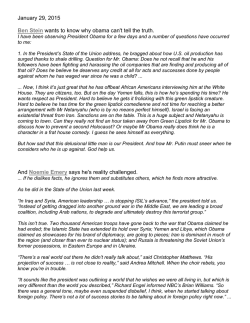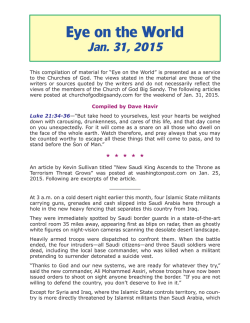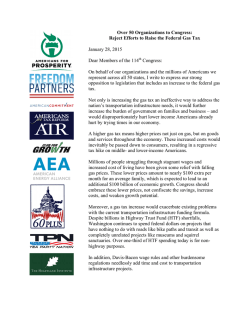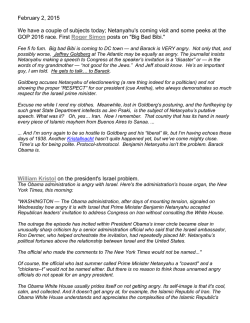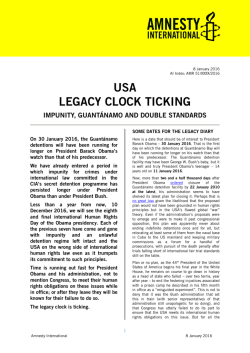
P21_Layout 1 - Kuwait Times
Business Gulf banks likely to need $35bn of capital by 2019 Page 22 NBK most valuable banking brand in Kuwait TUESDAY, FEBRUARY 3, 2015 Page 23 Bahrah Trading Co holds spectacular field show for Al-Babtain launches all-new Renault Bobcat Captur in Kuwait Page 26 Page 25 WASHINGTON: News cameras get a look as President Barack Obama’s new $4 trillion budget plan is distributed by the Senate Budget Committee as it arrives on Capitol Hill in Washington, early yesterday. — AP Obama sends $4tn budget to Congress Foreign profits tax tied to big public works spending WASHINGTON: President Barack Obama sent Congress a $4 trillion budget yesterday that calls for huge spending on infrastructure funded by a one-time tax on profits US companies have amassed overseas. The business-friendly Republican-controlled Congress is all but certain to say no. The foreign earnings tax would be part of a broader administration plan to overhaul corporate taxes by ending certain tax breaks and lowering rates, a challenging task that Obama and Republican congressional leaders insist they are poised to tackle this year. The spending document for the 2016 fiscal year beginning Oct 1 also reflects goals Obama set out in his State of the Union speech, particularly higher taxes on wealthy Americans to shrink the growing gap between high-income and middle-class citizens. The administration said the budget represented a strategy to strengthen the middle class and help “hard-working families get ahead in a time of relentless economic and technological change.” Obama’s fiscal blueprint, for the budget year that begins Oct 1, proposes spending $4 trillion $3.99 trillion before rounding - and projects revenues of $3.53 trillion. That would leave a deficit of $474 billion. Obama’s budget plan never reaches balance over the next decade and projects the deficit would rise to $687 billion in 2025. The administration contends that various spending cuts and tax increases would trim the deficits by about $1.8 trillion over the next decade, leaving the red ink at manageable levels. Congressional Republicans say the budgets they produce will achieve balance and will attack costly benefit program like Social Security, Medicare and Medicaid. The question is what kind of negotiated middle ground, if any, will emerge in a climate of the overwhelming partisan divide separating Obama and his Democrats from Republicans, many of whom have made their goal to stop or reverse virtually all of the president’s domestic initiatives. Obama, in an NBC interview before the Super Bowl, disputed a suggestion that he and Congress are so far apart that his budget proposals have no chance of winning approval. “I think Republicans believe that we should be building our infrastructure,” Obama said. “The question is how do we pay for it? That’s a negotiation we should have.” Obama’s new budget offers an array of spending programs and tax increases on the wealthy that Republican lawmakers have already rejected. The likely meeting ground is the tax rate on US companies. The current 35 percent top tax rate for corporations in the United States, the highest among major economies, Oil’s fresh rally lifts Saudi MIDEAST STOCK MARKETS DUBAI: A rebound in global oil prices and decisions by state-controlled companies to pay cash bonuses to employees boosted Saudi Arabia’s stock market yesterday, while other Gulf bourses were mixed in choppy trading. Brent crude fell in early trade on news of a US refinery strike and weak Chinese manufacturing data, but bounced back later in the day and traded above $54 per barrel by the time Saudi Arabia’s market closed. The Saudi stock index rose 0.8 percent as petrochemicals firm Saudi Basic Industries, the kingdom’s largest listed company, jumped 2.4 percent; other stocks in the sector also climbed. Petrochemical prices are linked to oil and the sector was hit hard in a sell-off triggered by oil’s plunge last year. Retailers also performed well yesterday: Fawaz Alhokair surged 8.8 percent and Jarir Marketing jumped 2.6 percent. This followed announce- ments by large companies such as Saudi Electricity and Saudi Telecom that they would pay out hundreds of millions of dollars in bonuses to their workers, following last Thursday’s order by the new king that Saudi state employees would receive two months of extra salary to mark his accession. Part of the corporate bonuses is expected to be spent on consumer goods, boosting the retailers’ revenues and profits. Investors were less enthusiastic about the companies which will use their resources to pay out the cash; shares in Saudi Electricity edged up 0.6 percent, while Saudi Telecom fell 0.8 percent. UAE, EGYPT Other Gulf markets had closed when oil was still in the red and their performances were mixed. Dubai’s index fell 1.1 percent; the benchmark had surged 4.5 percent in the previous session. But shares in property developer DAMAC shot up 6.8 percent after it reported an 11 percent rise in fourth-quarter profit yesterday, according to Reuters calculations. Abu Dhabi’s index edged down 0.6 percent as most blue chips pulled back. Oman’s market was nearly flat, while Kuwait edged up 0.3 percent. Qatar’s benchmark added 0.5 percent, largely on the back of Islamic lender Masraf Al-Rayan, which jumped 3.9 percent. The bank reported estimate-beating fourth-quarter results and a dividend hike last week. Meanwhile, shares in Qatar National Bank dropped 2.0 percent as they no longer carried the 2014 dividend. Egypt’s bourse edged up 0.5 percent as property developers continued to gain on hopes that Egyptians will use real estate as a hedge against the weakening pound. Talaat Moustafa Group rose 1.2 percent, Amer Group added 0.8 percent and Palm Hills Development gained 0.2 percent. — Reuters serves as a disincentive and many US companies with overseas holdings simply keep their foreign earnings abroad. The question remains whether there will be sufficient flexibility in negotiations to keep Obama from vetoing the budget, a move that would force, yet again, last-minute emergency talks, a possible government shutdown or a socalled continuing resolution that would fund the government at current levels. Under Obama’s plan, the top corporate tax rate for company profits earned in the U.S. would drop to 28 percent. While past foreign profits would be taxed immediately at the 14 percent rate, going forward new foreign profits would be taxed immediately at 19 percent, with companies getting a credit for foreign taxes paid. Opposition Republicans are opposed virtually across the board to anything that would increase taxes, such as closing loopholes. They also are against taxing foreign profits and will likely block that avenue for funding Obama’s infrastructure plans. The White House believes it has some leverage on taxing foreign earnings by linking the revenue to construction projects that could potentially benefit the home districts of every member of Congress. The budget will call for the one-time 14 percent manda- tory tax on the up to $2 trillion in estimated US corporate earnings that have accumulated overseas. That would generate about $238 billion, by White House calculations. The remaining $240 billion would come from the federal Highway Trust Fund, which is financed with a gasoline tax. Obama is releasing his budget as the federal deficit drops and his poll numbers inch higher. Although Republicans will march ahead on their own, they ultimately must come to terms with the Democratic president, who wields a veto. Ahead loom big challenges. Obama is proposing to ease automatic cuts to the Pentagon and domestic agencies with a 7 percent increase in annual appropriations. He wants a $38 billion increase for the Pentagon that Republicans probably will want to match. But his demand for a nearly equal amount for domestic programs sets up a showdown with Republicans. Another centerpiece of the president’s tax proposal is an increase in the capital gains rate on couples making more than $500,000 a year. The rate would climb from 23.8 percent to 28 percent. Obama wants to require estates to pay capital gains taxes on securities at the time they are inherited. He also is trying to impose a 0.07 percent fee on the roughly 100 US financial companies with assets of more than $50 billion. — AP Philippines may surpass China as Asia’s fastest growing economy MANILA/JAKARTA: The Philippines may surpass China to be Asia’s fastest growing economy this year, but its bigger challenge is working out how to sustain and share the gains of the past five years to secure longer-term prosperity. Since President Benigno Aquino came to power in 2010 and embarked on a reform and governance push, the Philippines has become a hot investment favorite and one of the fastest-growing economies in the world. Investors now want to know how the Southeast Asian country will be able to sustain fiscal and economic policies that have spurred growth and reduced poverty after Aquino’s term ends next year. “We think that 2016 is critical in terms of the long-term outlook of the Philippines,” said Eugenia Victorino at ANZ bank. The Philippines defied the region’s slowdown in the fourth quarter by regaining momentum, bringing full-year growth to 6.1 percent the fastest expansion in Asia after China. This year, Aquino is aiming for growth of 7-8 percent, while China’s growth is expected to slow to around 7 percent. MORE INCLUSIVE Aquino has fought corruption and prioritized infrastructure improvements that are pivotal to raising growth potential. However, the economy is still mired with high unemployment. The World Bank has said Philippine growth is now “more inclusive”, and there are signs benefits are trickling down. More than one million jobs were created in 2014 and unemployment fell to 6 percent, the lowest for at least a decade. But job creation has still struggled to match the number of people looking for work; 42 percent of the population still live on less than $2 per day. Vibrant sectors, such as booming back-office firms, earn foreign exchange but don’t spread a lot of prosperity. “To have one of those jobs, you need some skills. At a minimum, decent command of English and computer literacy, but often a bit more than that,” said Dan Martin at Capital Economics. Manufacturing, the sector probably best able to raise productivity and the income of low-skilled workers, could benefit as low wages and a competitive currency help the Philippines grab some of the production that is leaving China because of rising costs. AFTER AQUINO Aquino, limited by the constitution to a single term in office, has improved public finances and boosted investment in roads, ports and schools through public-private partnerships. Last summer, wrangles with the Supreme Court caused a seize-up of government spending, but it resumed after Congress passed a supplementary budget in December. “We’re very hopeful that the Aquino government will be able to release the funds to continue with its infrastructure programs,” said Victorino. The outlook from mid-2016, following the elections for a new president and half of Congress, is far less certain.— - Reuters
© Copyright 2026

